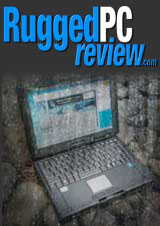« Ultra-rugged waterproof displays | Main | Thoughts about ingress protection: eliminate potential points of failure »
November 10, 2008
Benchmarking popular mobile Intel processors
Well, we finally managed to benchmark a mobile device with an Atom processor. Like everyone else, I was wondering where Atom performance fits in. The Thermal Design Power (TDP) of the 45nm Atom processors is so ridiculously low that it's impossible to even make an educated guess. There are, of course, a number of different Atom processors out there, but one that appears to be popular in small mobile devices is the Atom N270.
The N270 is a single-core processor that runs at 1.6GHz and has a TDP of 2.5 watts -- significantly less than even an ultra-low voltage Intel Core Solo and only a small fraction of the power consumption of your average consumer notebook. There are other system parts that use power, and for now Intel doesn't offer Atom-compatible chipsets that are nearly as miserly as the processor itself. Further, a lot of the advanced features we've come to take for granted in Intel Core processors are simply not part of the Atom. Instead, Intel resorted to the hyper-threading technology from its past. It's all quite complex and it probably takes a chip design experts to tell how various Intel technologies impact performance.
What we can do is run benchmarks, and that's what we did on an Atom N270-powered Acer Aspire One netbook, an exceedingly handy little clamshell computer with an WXGA 8.9-inch display and a weight of just over two pounds. The tiny Acer came with a gigabyte of RAM, a 160GB 5400rpm disk, and ran Windows XP. Our standard benchmark suite, PassMark, did not complete and so we switched to CrystalMark 2004R2. Here are the results:
| PERFORMANCE COMPARISON | Intel A110 | Core Solo U1400 | Atom N270 | Core Duo U2500 |
| Clock speed | 800MHz | 1.2GHz | 1.6GHz | 1.2GHz |
| Test Unit | GETAC E100 | Motion F5 | Acer One | Xplore 104C4 |
| Thermal Design Power (TDP) | 3.0 watts | 5.5 watts | 2.5 watts | 10.0 watts |
| ALU | 3026 | 4565 | 5544 | 9291 |
| FPU | 3682 | 5343 | 5370 | 11124 |
| MEM | 2732 | 4989 | 4442 | 6132 |
| HDD | 3614 | 3252 | 7900 | 6381 |
| GDI | 3040 | 4239 | 3293 | 3987 |
| D2D | 2530 | 4221 | 2912 | 3899 |
| OGL | 738 | 1151 | 684 | 1187 |
| Overall CrystalMark | 19362 | 27760 | 30145 | 42001 |
These figures suggest that systems equipped with the Atom N270 are quite a bit quicker than machines with the Atom's predecessor chip, the A110, but only a bit faster than the first-gen Intel Core Solo. The 1.6GHz Atom N270 is no match for the 1.2GHz Core Duo U2500 that's used in a number of high-performance Tablet PC slates. The high clock speed of the single core N270 is therefore a bit misleading. Clock cycle for clock cycle, the unloved Core Solo is more powerful.
However, in a lean, smartly designed system with enough RAM and a speedy disk, such as the Acer One netbook, the N270 can deliver both power and economy. The Acer feels fairly quick, and it runs about 2-1/2 to three hours on a small 24 watt-hour 3-cell battery and 5-1/2 to six hours on a 49 watt-hour 6-cell battery.
Posted by conradb212 at November 10, 2008 9:59 PM
















